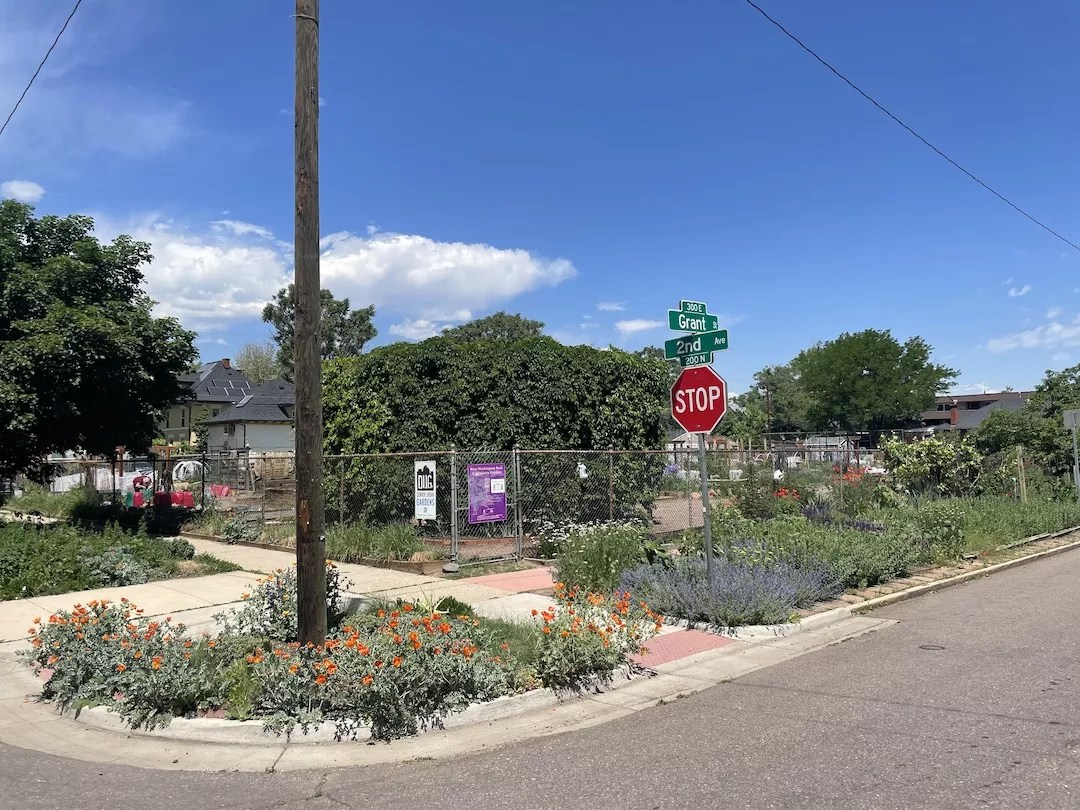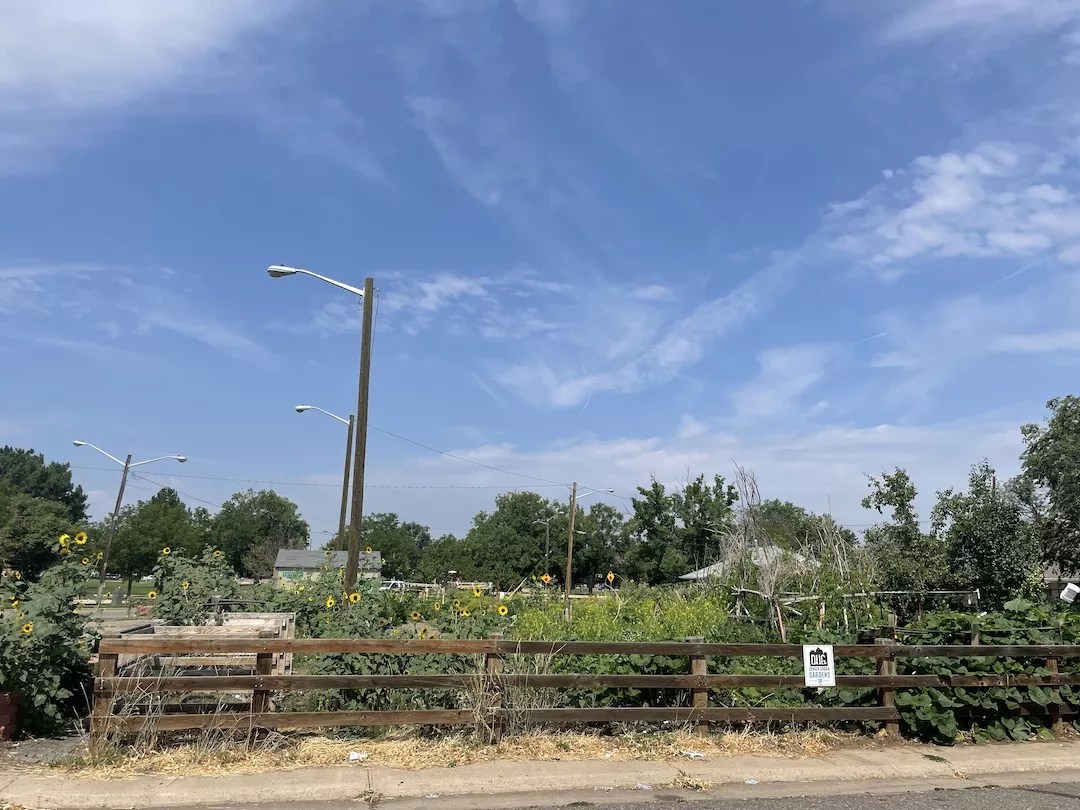
Linda Appel Lipsius

Audio By Carbonatix
There’s a difference between “community gardening” and “gardening in community,” explains Linda Appel Lipsius, director of Denver Urban Gardens. The turn of phrase expands the idea of gardening from individual plant cultivation to “a tool of action,” she continues. “That’s kind of my rally cry.”
DUG, a nonprofit network of community gardens, was started in 1985 and currently supports almost 190 sites in six metro Denver counties. But with growth has come challenges: DUG is rebuilding after several years of financial crises. A year ago, the organization was forced to sell two-thirds of El Oasis, one of its Highland properties, to pay off $500,000 in debt.
Now DUG wants to broaden public perception of the organization. That vision of “gardening in community” will allow DUG to reach beyond people who love to tend to their own plot of land and expand into new communities, Lipsius explains. DUG also plans to develop programming that will address food access, health and wellness, climate change, education and skill-building.
“Going through challenging times makes organizations and people much more open to change and to evolution,” she notes. “The organization was ripe for a reimagining.”
DUG is also trying to improve its finances; Lipsius anticipates that by the end of the year, the group will be on track for $2 million in revenue for 2021. The organization has focused on raising new funds by expanding corporate partnerships and offering more volunteer workdays, classes and garden adoptions.
Lipsius joined the board in early 2020 after meeting other DUG organizers through a permaculture design course with the Denver Permaculture Guild. She stepped in as DUG’s interim director in October 2020 after the previous director, Dr. Violeta Garcia, left during controversy over the El Oasis land sale.
Lipsius didn’t set out to become the permanent director, but the more she learned about the scope of DUG’s work, the more excited she became. “We really are part of the fabric of Denver,” she says, adding that she was also inspired by the DUG staff’s enthusiasm and expertise.”Over my years of running businesses, that’s the hardest thing to find: the passion and the commitment.”

Linda Appel Lipsius spoke at DUG’s annual fundraising event about the organization’s expanded vision.
Ashley Newell Photography
Lipsius has a background in business. After graduating from Columbia University with a degree in political science in 1993, she worked for health-education nonprofits and realized that to continue in that sector, she’d need real-life experience. “Nonprofits are a business as much as for-profits are,” she explains. She received her MBA in finance and organizational management from New York University’s Stern School of Business, then worked for her family’s cleaning-products company, Orange Glo International, for a number of years. She co-founded Teatulia, a Denver-based organic tea company, in 2006 and spent approximately fourteen years as CEO (read our story of Lipsius’s time at Teatulia here).
One of the first things Lipsius did in her new position as DUG director was conduct a listening tour to better understand what role gardeners wanted the organization to play. From many people, she heard that, “yes, [DUG] stumbled, and yes, we’ve had some troubles,” she recalls, but adds that “people still believed in us and still understood that at the foundation, this is an organization that deserves to survive and thrive.”
But many people also asked Lipsius to stop building more community gardens, and instead focus on the locations it already had. DUG had built between fifteen and twenty gardens a year between 2015 and 2020, she says; pausing expansion would allow the organization to strengthen those it already had.
The DUG team considered the comments and compiled a “Baseline Infrastructure Initiative.” The core areas focus on building physical, resource and human capacity. Physical goals vary from improving pathways and plot borders to building shade structures and outdoor classes; DUG also plans to provide more compost and seed delivery as well as more gardening education.
DUG divided its almost 190 gardens into seven micro-networks, and organized community events such as classes and social opportunities for those groups. To put more boots on the ground, offering leadership and general support, the nonprofit created DUG Corps. The new DUG staffers serve as community liaisons who audit every garden and document projects that need to be completed. They also conduct interviews and address gardeners’ questions. This past season, the group had two DUG Corps employees and one apprentice. Lipsius hopes that next year there will be enough funding for at least seven DUG Corps members, as well as one Corps leader and one apprentice lead.
“The feedback we’ve gotten from the gardeners has been, you know, ‘We’re seeing you for the first time,'” Lipsius explains. “[They] feel supported.”
The team helped some non-English speakers fill out applications for plots, and worked on creating bi-lingual signage. Signage in general has been a priority: “We’re one of Denver’s best-kept secrets, and we’re trying to change that,” she says.

“We’re one of Denver’s best-kept secrets, and we’re trying to change that,” Lipsius says.
Linda Appel Lipsius
DUG’s expanded mission will enable it to apply for grants from a broader range of funders. So far, it’s seen increased support from Sprouts Healthy Communities Foundation and new funding from Jefferson County Public Health and the Community First Foundation to support their Baseline Infrastructure Initiative. DUG has also established a three-year partnership with Liberty Global for work in the Cole neighborhood.
Lipsius is particularly excited about raising new revenue in partnership with corporations and apartment complexes; DUG has been hired to manage several gardens, and plans to build pilot commercial gardens in 2022. The businesses will pay “above and beyond the standard gardening operating relationship” of the traditional community gardeners, Lipsius explains.
But while the organization plans to beef up its relationship with businesses, DUG still has a deep commitment to its community gardens. Lipsius says the organization will add more of these, “but at an intentional, measured pace.”
Now that almost all the fruits and vegetables in the gardens have been harvested, DUG staff is busy preparing educational opportunities for the winter. “We really want to be a resource twelve months a year,” Lipsius says.
DUG just can’t stop growing.